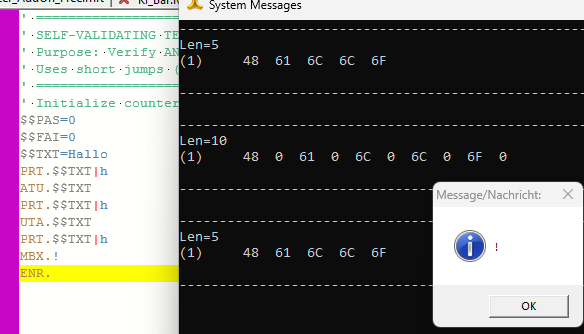MiniRobotLanguage (MRL)
ATU.
ANSI to UNICODE String Conversion

Intention
This command converts an ANSI string to its UNICODE equivalent using PowerBASIC's UCODE$ function. The result is placed on the Top of Stack (TOS) or in a specified variable.
The command supports three calling formats: TOS-to-TOS, Variable-to-Variable, and Source-to-Target Variable.
This command is useful for legacy programs that need to handle UNICODE byte strings stored in ANSI format, or when interfacing with APIs that require UNICODE strings in a specific format.
The conversion preserves character data but doubles the byte count (since UNICODE uses 2 bytes per character).
Schematic
Input: "Hello" (5 bytes) --> Output: "Hello" (10 bytes, 2 per char)
|H|e|l|l|o| --> |H|H|e|e|l|l|l|l|o|o|
^ (ANSI) ^ (UNICODE via UCODE$)
Syntax
ATU.[P1[|P2]]
Parameter Explanation
•No Parameters - Converts TOS to UNICODE and replaces TOS with result.
•P1 (Single Parameter) - Converts variable P1 to UNICODE and stores result in P1.
•P1|P2 (Two Parameters) - Converts variable P2 to UNICODE and stores result in P1.
Examples
' TOS conversion: Convert string on stack
$$SRC=Hello
PUSH.$$SRC
ATU.
$$RES=$tos$
' $$RES now contains UNICODE version
' Single parameter: Convert and store in same variable
$$TEXT=Test
ATU.$$TEXT
' $$TEXT now contains UNICODE version
' Two parameters: Convert source to target variable
$$SRC=ABC
ATU.$$TARGET|$$SRC
' $$TARGET now contains UNICODE version of $$SRC
'-------------------------------------------------------------
' Conversion Test
'
$$TXT=Hallo
PRT.$$TXT|h
ATU.$$TXT
PRT.$$TXT|h
UTA.$$TXT
PRT.$$TXT|h
MBX.!
ENR.
Remarks
-Uses PowerBASIC's UCODE$ function for conversion.
-Result is stored as ANSI byte string containing UNICODE data.
-Result string is twice the length of input string (2 bytes per character).
-Variables are resolved once to prevent unwanted expansion.
-No code page parameter supported; uses default system code page.
-For new programs, use WIDE UNICODE variables ($$) instead of this function.
Limitations
-No explicit code page parameter; uses system default.
-Result is stored as ANSI byte string (not WIDE string).
-Only for legacy conversion; new code should use $$ variables.
See also: